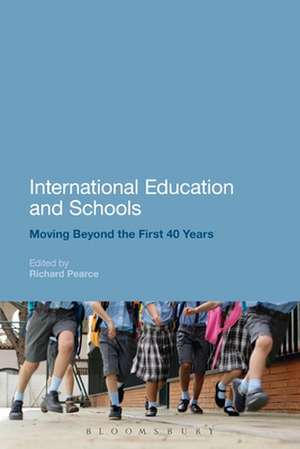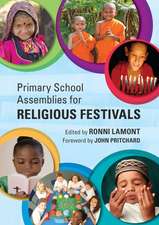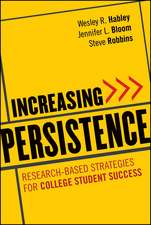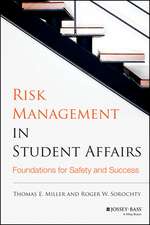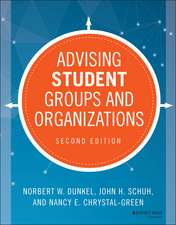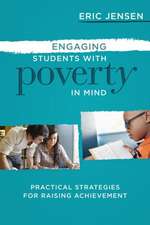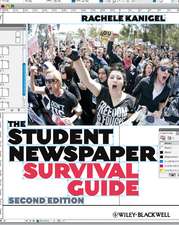International Education and Schools: Moving Beyond the First 40 Years
Editat de Richard Pearceen Limba Engleză Paperback – 23 oct 2013
| Toate formatele și edițiile | Preț | Express |
|---|---|---|
| Paperback (1) | 252.16 lei 3-5 săpt. | |
| Bloomsbury Publishing – 23 oct 2013 | 252.16 lei 3-5 săpt. | |
| Hardback (1) | 833.47 lei 6-8 săpt. | |
| Bloomsbury Publishing – 23 oct 2013 | 833.47 lei 6-8 săpt. |
Preț: 252.16 lei
Preț vechi: 323.34 lei
-22% Nou
Puncte Express: 378
Preț estimativ în valută:
48.26€ • 49.74$ • 40.75£
48.26€ • 49.74$ • 40.75£
Carte disponibilă
Livrare economică 08-22 februarie
Preluare comenzi: 021 569.72.76
Specificații
ISBN-13: 9781472510747
ISBN-10: 1472510747
Pagini: 264
Dimensiuni: 156 x 234 x 20 mm
Greutate: 0.42 kg
Editura: Bloomsbury Publishing
Colecția Bloomsbury Academic
Locul publicării:London, United Kingdom
ISBN-10: 1472510747
Pagini: 264
Dimensiuni: 156 x 234 x 20 mm
Greutate: 0.42 kg
Editura: Bloomsbury Publishing
Colecția Bloomsbury Academic
Locul publicării:London, United Kingdom
Caracteristici
A critical compendium of reflections on the past, present and future of international education in schools by recognised experts in the field
Notă biografică
Richard Pearce is an Education Consultant for the International School of London, UK.
Cuprins
Notes on ContributorsIntroduction, Richard Pearce (International School of London, UK)Part I: A Historical Overview1. International Schools: Antecedents, Current Issues and Metaphors for the Future, Mary Hayden (University of Bath, UK) and Jeff Thompson (University of Bath, UK)2. Charting the Growth of International Schools, Nicholas Brummitt (International School Consultancy Group, UK) and Anne Keeling (ISC Research, UK)3. The Effects of Children's Education and Supporting Organizational Policy and Practice on Corporate Expatriation, Susan Shortland (London, Metropolitan University, UK)Part II: Emerging Themes 4. Student Diversity: The Core Challenge of International Schools, Richard Pearce (International School of London, UK)5. English Language Teaching: The Change in Students' Language from 'English Only' to 'Linguistically Diverse', Maurice Carder (Language Matters in International Education, Austria)6. The Pestalozzi Influence on International Education, David Wilkinson (education consultant, UK) and Veronica Wilkinson (education consultant, UK)7. International Education and Global Engagement: Education for a better world?, Boyd Roberts (global education consultant, UK)8. Understanding International Education Through Discourse Theory: Multinational, international, multicultural or intercultural?, Michael Allan (International School of Amsterdam, The Netherlands)Part III: The New Critique9. The International Baccalaureate and the Role of the 'Pioneer' International Schools, Tristan Bunnell (Copenhagen International School, Denmark)10. Dilemmas of International Education: A Bernsteinian Analysis, James Cambridge (Global Education Today, UK)10. Boundaries and Boundary Management in International Schools: Psychodynamics and Organizational Politics, Richard Caffyn (International School Telemark, Norway)ReferencesIndex
Recenzii
This collection takes a long, hard look at international schooling and how such branding has been stretched, compromised, challenged and changed over the last forty years while appetites for its services have flourished. Authors with a variety of perspectives and stakes look both backwards and forwards, reflecting on how this sector has become a victim of its own success, its idealism prey to the market logics currently at play across all educational sectors. The book reveals a maturing field of enquiry asking more difficult and searching questions, in particular around the politics of language, curricular enactment and the place of international curricula such as the IB in globalising times. Teachers and school leaders in this sector will find this a valuable tool to help reflect on what the changes underway might mean for their practice and mission.
'We are entering an era that has not only witnessed the exponential rise of international schools worldwide, but the simultaneous interest in international and global education being embraced by more and more schools in the public sector. Pearce and his colleagues have compiled an invaluable resource that provides essential reading for both those new to the field as well as the practising international educator. An exceptional array of contributing authors present, in one concise volume, a forty-year retrospective of the evolution of international schools, major historical developments and challenges facing the field, current research, and latest thinking in the field of international education and schooling. A must-read for anyone interested in the field of international education.'
Richard Pearce has put together a set of essays that considerably advances our understanding of the increasingly complex world of international schools at a time when the increasing complexity and diversity of such schools makes critical analysis crucially important. The emerging issues are addressed with admirable clarity.
International Education and Schools presents a set of informative and provocative chapters on international education as derived from historical and present-day contexts of international schools. The book's contributors have long-standing experience in the field of international schools. They bring theory and practice together to generate insights for enhancing conceptions, research and/or practices of international education, given both the heightened presence of, and emergent challenges for, international education in a globalizing world.
'We are entering an era that has not only witnessed the exponential rise of international schools worldwide, but the simultaneous interest in international and global education being embraced by more and more schools in the public sector. Pearce and his colleagues have compiled an invaluable resource that provides essential reading for both those new to the field as well as the practising international educator. An exceptional array of contributing authors present, in one concise volume, a forty-year retrospective of the evolution of international schools, major historical developments and challenges facing the field, current research, and latest thinking in the field of international education and schooling. A must-read for anyone interested in the field of international education.'
Richard Pearce has put together a set of essays that considerably advances our understanding of the increasingly complex world of international schools at a time when the increasing complexity and diversity of such schools makes critical analysis crucially important. The emerging issues are addressed with admirable clarity.
International Education and Schools presents a set of informative and provocative chapters on international education as derived from historical and present-day contexts of international schools. The book's contributors have long-standing experience in the field of international schools. They bring theory and practice together to generate insights for enhancing conceptions, research and/or practices of international education, given both the heightened presence of, and emergent challenges for, international education in a globalizing world.
